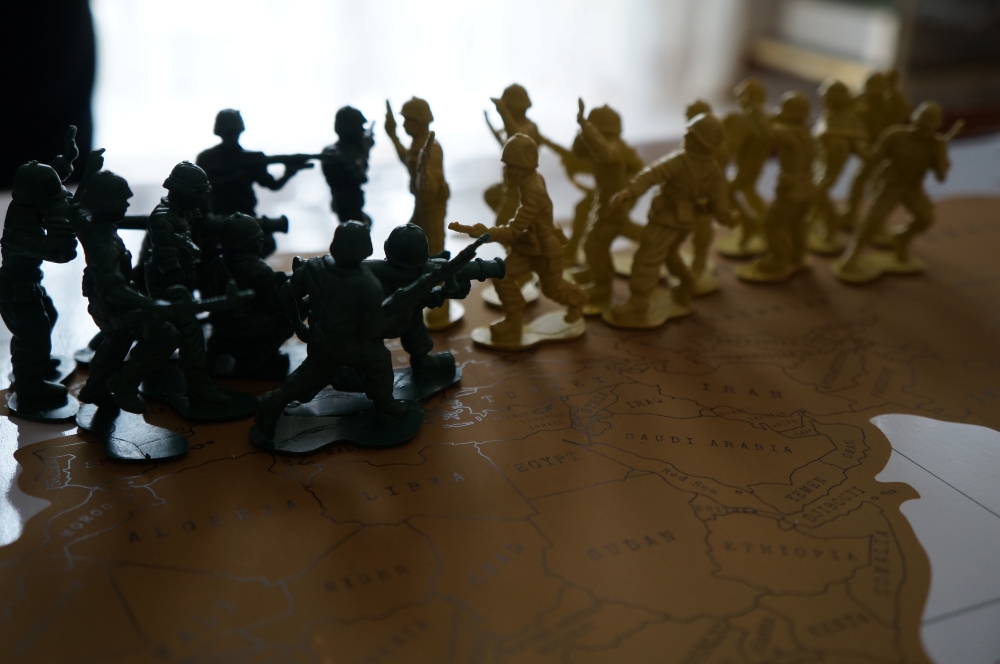
The world witnessed a profound transformation on the night of June 21, 2025, when American B-2 bombers struck three Iranian nuclear facilities at Fordow, Natanz, and Isfahan. President Donald Trump's unprecedented decision to directly join Israel's military campaign against Iran represents more than just another Middle Eastern conflict. Rather, it marks the definitive collapse of the post-World War II international order and the emergence of a new paradigm where might makes right.
The simultaneous eruption of major conflicts across multiple theatres has exposed the fundamental weakness of international law in constraining state behaviours. Russia's full-scale invasion of Ukraine, which began in 2022 and continues to violate core principles of territorial integrity and sovereignty, has already demonstrated how powerful states can act with impunity. The ongoing war represents a manifest violation of the UN Charter, and has fundamentally challenged the international legal framework.
The May 2025 India-Pakistan conflict, triggered by the Pahalgam terrorist attack that killed 26 civilians, further illustrated this breakdown. India's Operation SINDOOR involved missile strikes across international borders, while Pakistan responded with its own military operations, marking the most intense use of force between India and Pakistan since the 1971 war. Both nuclear-armed neighbours engaged in unprecedented drone warfare and targeted each other's military installations with apparent disregard for established conflict resolution mechanisms.
Now, with the United States directly attacking Iranian nuclear facilities, the violation of international law has reached new heights. This represents a direct breach of Article 2(4) of the United Nations Charter. The pattern is unmistakable: international legal frameworks have become mere suggestions rather than binding constraints on state behaviours. It has been often the case in the past, but in the last couple of years it has become the norm.
What we are witnessing is the emergence of a doctrine where states simply reshape regional geopolitics through military force when diplomatic solutions prove insufficient or inconvenient. This represents a fundamental shift from the post-1945 consensus that sought to resolve disputes through international institutions and legal mechanisms. The current conflicts demonstrate that powerful nations no longer feel constrained by traditional diplomatic processes. Russia's approach to Ukraine, Israel's campaign against Iran, India's strikes on Pakistan, and US intervention in the Middle East all follow the same logic: when a state perceives threats to its interests or simply dislikes the existing regional balance, it resorts to military action to impose its preferred outcome.
This paradigm shift is particularly evident in how these conflicts have been justified. Each aggressor has framed its actions in terms of existential necessity. Russia claiming to defend ethnic Russians, Israel arguing for pre-emptive action against nuclear threats, India responding to terrorism, and the United States asserting the need to prevent Iranian weapons development. The justifications vary, but the underlying principle remains consistent: unilateral military action is now the preferred tool for reshaping unwelcome geopolitical realities.
This new paradigm creates a dangerous precedent where every nation can claim the right to use force to alter regional dynamics. If the United States can bomb Iranian nuclear facilities, if Russia can annex Ukrainian territory, if India can strike Pakistan, and if Israel can wage preventive war, then the logical conclusion is that any state with sufficient military capability can justify similar actions. The implications are profoundly destabilizing. We now live in a world that is less cooperative and more defensive where the crisis of multilateral cooperation may even reach a peak. The erosion of international law creates a security dilemma where each state's efforts to enhance its security through military action inevitably threatens others, leading to an escalatory spiral. This dynamic is already visible across multiple regions. The breakdown of ceasefire agreements, the failure of diplomatic initiatives, and the increasing reliance on military solutions all point to a world where stability depends entirely on the balance of military power rather than shared legal frameworks. When international law becomes meaningless, the only constraint on state behaviours is the threat of retaliation.
Perhaps most troubling is how recent events have legitimized the concept of pre-emptive military action by major powers. In each case, the aggressor claimed to be acting defensively or preemptively, but the cumulative effect has been to normalize the first use of force by major powers. This creates an especially dangerous precedent for China, which has notably refrained from similar military interventions despite growing tensions over Taiwan. The cruel irony is that China, despite being characterized as a threat by Western powers, remains the only major power that has not initiated a significant military intervention in the past decade. China's peaceful rise doctrine, while sometimes viewed sceptically, stands in stark contrast to the actual military actions of Russia, the United States, India, and Israel. Given this context, it becomes increasingly difficult to maintain moral authority in discouraging Chinese military action when all other major powers have demonstrated that force is an acceptable tool for achieving strategic objectives.
Europe's irrelevance in the new order
Throughout these cascading crises, European nations have been reduced to the role of ineffective bystanders. Despite hosting diplomatic talks and issuing countless statements, European powers have demonstrated a complete inability to influence events or constrain the actions of more decisive actors. The recent attempt by Germany, France, and the United Kingdom to mediate between Iran and Israel perfectly illustrates Europe's diminished status. Their Geneva discussions with Iranian Foreign Minister Abbas Araghchi yielded no concrete results, with President Trump dismissing European diplomatic efforts as irrelevant. Trump bluntly stated that Iran does not want to speak to him, they will speak to Europe, but Europe is not going to be able to help in this one.
This marginalization reflects deeper structural problems with European foreign policy. Despite having a combined gross domestic product of approximately €17 trillion, European powers have proven unable to translate economic strength into geopolitical influence. Their emphasis on soft power, legal solutions, and multilateral diplomacy appears increasingly anachronistic in a world governed by military strength.
If single countries are irrelevant, so is the European Union. Its response to these crises has been characterized by internal divisions, contradictory policies, and an inability to move beyond symbolic gestures. While European leaders continue to call for ceasefires and dialogue, the actual combatants ignore these appeals and pursue their military objectives without consequence. Europe has become what one observer termed a well-meaning NGO whose humanitarian contributions are welcomed but is otherwise ignored. European countries have also demonstrated fundamental inconsistencies in their approach to international law. While strongly supporting Ukraine based on legal principles, many European governments have shown reluctance to apply the same standards to other conflicts, revealing that their commitment to international law is selective rather than universal.
Madness or cynical calculus?
Are all world leaders mad? In reality, since a few years, the world has become a tangle of variables that most political leaders with moderate positions have been unable to deal with – especially those loved by the people because they take care of their daily lives rather than “wasting money” in foreign policy.
Instead, the naked truth is that in a world characterized by an exponential increase in geopolitical variables, ranging from technological disruptions and climate change to demographic shifts and resource scarcity, traditional reactive approaches to international relations have become increasingly inadequate. The complexity of modern decision-making environments, where decision-makers must navigate enormous numbers of unknown variables and parameters under conditions of deep uncertainty, fundamentally favours those who seize and maintain the initiative rather than those who merely respond to external stimuli. This reality explains why assertive behaviours have become not just advantageous but essential for state survival and prosperity in the contemporary international system. And this also explains – at least in part – why European countries struggle to get back growth and prosperity. Their wait-and-see policies are completely at odds with the dynamics that govern the world today.
From a purely analytic point of view, the mathematical principles underlying complex systems demonstrate that proactive actors gain what strategists term ‘first-mover advantage’ (the competitive edge obtained by being the initial significant actor to shape a particular strategic environment). In international relations, this translates to the ability to set the terms of engagement, define the parameters of conflict or cooperation, and force competitors into reactive positions where they must respond to initiatives rather than pursuing their own strategic objectives. States that maintain the initiative can exploit the decision-making cycle of their opponents, making their next move before adversaries have time to digest and react to previous actions. The strategic value of assertiveness becomes even more pronounced when considering the limitations of reactive approaches in complex environments. Countries that adopt purely responsive strategies find themselves constantly adapting to external policies and initiatives, losing the ability to focus on their own strategic ends and becoming trapped in what scholars describe as a ‘reactive mode’ that is difficult to escape. This dynamic is particularly dangerous in multipolar systems where multiple countries are simultaneously pursuing competing agendas, as reactive states become vulnerable to being outpaced by more decisive actors who can coordinate their moves across multiple theatres and timelines.
The empirical evidence from recent geopolitical developments strongly supports this theoretical framework, as demonstrated by China's proactive Belt and Road Initiative, which has allowed Beijing to set the agenda for infrastructure development and economic cooperation across multiple continents while forcing other powers to respond to Chinese initiatives rather than pursuing their own comprehensive strategies. Similarly, the current conflicts demonstrate how states that act first—whether Russia in Ukraine, Israel against Iran, or India against Pakistan—have been able to shape the strategic landscape and force their opponents into reactive positions, regardless of the ultimate outcomes of these conflicts.
Assertive attitudes are therefore the best option, always? Not really. It depends on the time frame considered in the political calculus. Unfortunately, another key trend we are witnessing is the habit to think about the short and medium term, without caring about long-term consequences. Perhaps, a message to the young people: please be wary of those telling you that all this is done for you to have a better future!
In fact, while this calculus of assertive initiative may deliver tactical advantages in the short and medium term, it fundamentally undermines the foundations necessary for sustainable peace and prosperity over longer horizons. The proliferation of assertive behaviours creates an escalatory dynamic where each state's pursuit of first-mover advantage generates security dilemmas that compel competitors to adopt increasingly aggressive postures, ultimately producing a world where the costs of maintaining strategic initiative exceed the benefits derived from it. Moreover, the complex global challenges that define the 21st century (ranging from climate change and pandemic response to economic inequality and technological governance) require unprecedented levels of international cooperation that become impossible when states prioritize unilateral advantage over collective problem-solving. The assertive paradigm may secure temporary strategic gains, but it systematically erodes the trust, predictability, and institutional frameworks essential for addressing existential threats that transcend national boundaries and can only be resolved through sustained multilateral collaboration.
The point of no return
The events of June 2025 represent a watershed moment in international relations. The direct military confrontation between major powers, the collapse of diplomatic mechanisms, and the normalization of preemptive warfare have created a new reality that cannot easily be reversed. We have crossed a threshold where international law has been so thoroughly undermined that it no longer serves as a meaningful constraint on state behaviours. The institutional architecture created after World War II—the United Nations, international courts, multilateral treaties—has proven inadequate to prevent or resolve conflicts between determined adversaries.
The current paradigm creates a self-reinforcing cycle where military action begets military action. Each successful use of force validates the approach and encourages other powers to pursue similar strategies. The result is a world where stability depends entirely on the military balance between competing powers rather than shared adherence to legal norms. This transformation has profound implications for global governance, economic cooperation, and human security. In a world where any dispute can escalate to military conflict, where international law provides no protection, and where major powers routinely resort to force, the prospects for addressing shared challenges become increasingly remote.
The paradigm shift is now complete. We have entered an era where the strongest powers shape global order through military force, and where weaker nations must either align with a patron or risk becoming victims of changing geopolitical winds. The post-war dream of a world governed by law rather than force has definitively ended, replaced by a harsher reality where only military strength matters. The question now is not whether this new paradigm will persist, but how long humanity can survive in a world where every international dispute carries the potential for escalation to major war. The tipping point has been reached, and there appears to be no path back to the stability and predictability that international law once promised to provide.
Marco Giulio Barone








